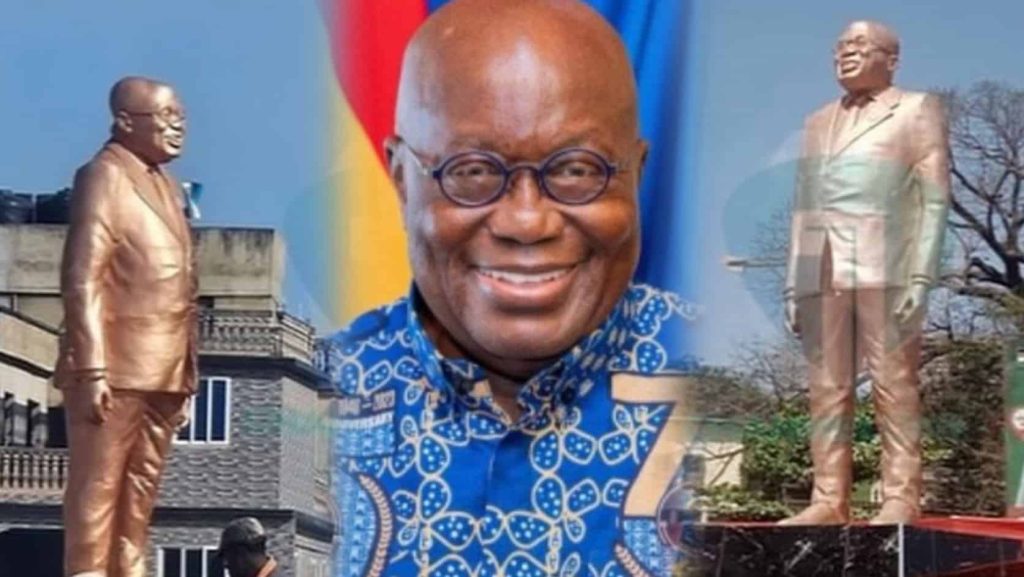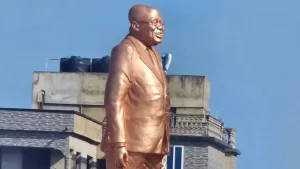
Ghana’s outgoing President Nana Akufo-Addo is facing widespread criticism after unveiling a statue of himself during a visit to the country’s Western Region. The monument, located outside the Effia-Nkwanta Regional Hospital in Sekondi, was meant to honor the president’s contributions to the region’s development, according to local officials. However, the statue has sparked a wave of backlash, with many Ghanaians accusing the president of self-glorification.
Opposition figures and ordinary citizens alike have taken to social media to express their disapproval, calling the statue a display of arrogance at a time when many important projects remain unfinished. Emmanuel Armah Kofi-Buah, an opposition MP, criticized the monument, saying, “The people of the Western Region deserve better than these self-serving displays.” His remarks reflect the frustration of many who see the statue as a symbol of vanity rather than a tribute to genuine progress.
President Akufo-Addo, who will step down in January after serving two terms, has repeatedly boasted of fulfilling 80% of his promises during his presidency. He unveiled the statue during a visit dubbed a “thank-you tour,” aimed at showing appreciation for the people of the Western Region. The region’s Minister for Development, Kwabena Okyere Darko-Mensah, highlighted several key projects initiated under Akufo-Addo’s leadership, including the expansion of infrastructure and efforts in healthcare.
Despite the positive spin on the unveiling, many Ghanaians are questioning the necessity of the monument. Some have pointed out that the country still faces pressing issues, including the completion of key projects and the high cost of living. “It would be admirable if the president had allowed posterity to recognize and appreciate his work,” wrote one critic on social media, suggesting that the statue’s installation now, rather than after his term ends, was a form of self-promotion.

The statue’s unveiling has gone viral, with photos circulating widely on social media. Some are calling for the monument to be removed once Akufo-Addo leaves office. Others, however, have defended the president’s decision, seeing the statue as a legitimate recognition of his role in the country’s development. “He is very deserving of this exquisite monument. The greatest president I’ve ever had. You will be missed by Ghanaians,” one supporter posted, praising Akufo-Addo for his leadership and for introducing free secondary education in Ghana, a policy the president has often called his “most significant legacy.”
Akufo-Addo’s administration has made strides in expanding educational access, with the introduction of free secondary education for all students. This initiative, along with other infrastructural developments, remains one of the president’s proudest achievements. During his tour, Akufo-Addo emphasized his education policy, which he views as a game-changer for Ghana’s future.
While the statue has become a source of division, the president’s tour has also served as a platform for political campaigning. Akufo-Addo used the occasion to urge voters in the Western Region to support his vice-president, Mahamudu Bawumia, in next month’s general elections. Bawumia is the ruling New Patriotic Party’s candidate and will seek to continue Akufo-Addo’s policies if elected. The upcoming election has already become a highly contested race, with former President John Dramani Mahama, of the opposition National Democratic Congress (NDC), challenging Bawumia for the presidency.
The economic situation in Ghana is a key issue in the election, with the high cost of living affecting many Ghanaians. Ghana, one of Africa’s top gold producers, is grappling with inflation, currency depreciation, and rising prices. These economic challenges have become central to the election campaigns, with both candidates expected to address the country’s financial woes in their platforms.
While the statue may have been intended as a celebration of President Akufo-Addo’s legacy, it has instead become a flashpoint for criticism and debate. As the country prepares for elections, the controversy surrounding the monument is just one of many challenges facing the president and his successor. Whether the statue will be remembered as a fitting tribute or a symbol of self-aggrandizement remains to be seen. What is clear, however, is that the public’s reaction to the monument will likely remain a topic of conversation long after Akufo-Addo leaves office.







